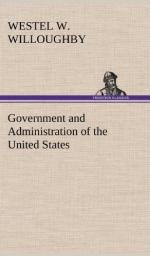In the political history of our country since the adoption of the constitution, there have been ever present two great constitutional questions, in the conflicting answers to which we must seek the origin and creeds of our great political parties. If we can gain a proper conception of the character of these two questions, we shall have taken a long step towards the understanding of the reasons for the conduct of the various opposing parties, and the basis of the disputes arising between them. These have been the two questions. First, What is the extent of the powers granted by the constitution to the National Government? Second, What is the real nature of our Union; and, arising under this problem, What is the extent to which the States are justified in opposing what they believe to be unconstitutional acts on the part of the National Government; and, Can a State or States, as a last resort, withdraw from the Union? The remainder of this chapter will be mainly devoted to a more particular examination of these questions.
What are the legitimate powers of the United States Government?
The United States government was the result of the union of thirteen independent colonies—a union voluntary on the part of the colonies, yet forced upon them by the evident need of some central power strong enough to enforce obedience at home and demand respect abroad. The determination of what and how many the national powers should be, was the work of the Constitutional Convention. Of the difficulties of this task we have already spoken.
In forming a scheme for a central government, there was the double necessity of creating a government strong enough to perform the duties for which it was established, and yet not so strong as to endanger the free self-government of the States. The delicate point to be adjusted was to give to the Federal Government only such powers as were necessary for the establishment of an effective National Government, and, as far as possible, to retain in the States their full governmental powers; in other words, to harmonize federal strength with State sovereignty.
The fear exhibited by the States in the debates preceding the adoption and ratification of the constitution of 1787, that the National Government might become too strong at the expense of their own powers of government, was not set at rest by the compromises obtained in the convention, nor by the eleven amendments adopted soon after the inauguration of the new government. The reason for the continuance of this fear is that the constitution is so worded that the powers of the general government are not precisely fixed.




